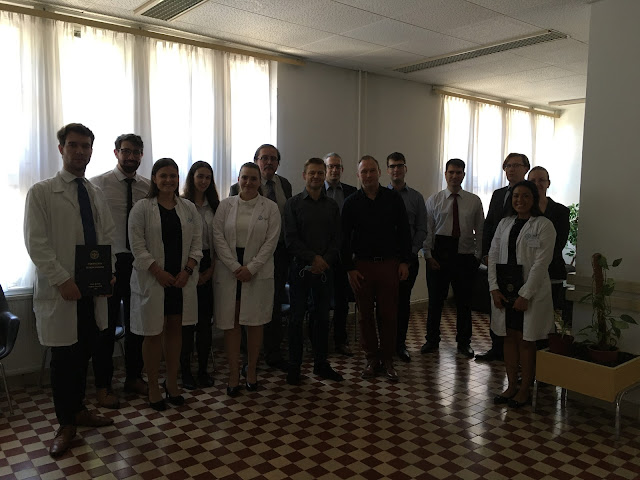Oral state exam experience
Today, I completed my final oral exam. The remaining component of my final closing examination.
At 7:30 am we all joined a call on Microsoft Teams and the lottery took place where we were assigned departments. One person pulled a paper with a name, another person pulled a paper with the name of a department, and a third person wrote this down.
I waited for what seemed like forever and finally when my name was called, I heard "Obstetrics & Gynaecology." This was a relief for me. I quickly opened up my Obstetrics & Gynaecology notes and revised some things I thought would be important to know then I left home and headed to the clinic.
The exam was scheduled to start at 9:00 am, but we were asked to arrive by 8:45 am at the latest. When I arrived at the secretary's office, I waited with the other students until a resident doctor came and took us to the ward to assign us a patient. At the ward, we were all assigned patients and given their files to look through. We were given about 30-40 minutes to do this before the resident doctor came back and told us it was time to go downstairs for the exam.
The examining committee was Prof. Kálmán Kovács (Obstetrics & Gynecology), Dr András Hajnal (Psychiatry), and Prof. Csaba Vermes (Orthopaedics). A few students went before me then it was my turn.
I walked in and I handed Prof. Kálmán my thesis. He started by looking through the exam began.
Professor: Tell me a bit about your patient.
Me: I had a 20-year-old patient who came to the hospital after an ultrasound at 25 gestational weeks and found her cervix to be shortened. She complained of abdominal tightening and pain.
Professor: Okay, so she was having contractions.
Me: Yes, she was diagnosed as having threatened preterm labour and was treated for this. She has been in the hospital since and at present, is 32 gestational weeks.
Professor: Alright, so a woman, 25 gestational weeks comes to you and is having contractions, what is the first thing you do?
Me: An ultrasound.
Professor: No.
Me: Check if the cervix is dilated.
Professor: Okay, what do you do next?
Me: Check the foetal heart rate.
Professor: And how do we do that?
Me: Cardiotocography (CTG).
Professor: Great and how does a CTG work?
Me: There are two transducers which are placed on the mother's abdomen. One is above the fundus of the uterus which measures the contractions and another is placed above the foetal heart and measures the heart rate.
Professor: Yes, exactly, what is the normal foetal heart rate? Is it more than 100?
Me: Yes, roughly around 110 bpm.
Professor: Alright now what do you do if the cervix is dilated?
Me: Give tocolytics and betamethasone to help the baby's lung develops.
Next, Dr Hajnal asked some questions about my thesis, the focus of which was depression and is in the field of expertise.
Doctor: Can you tell me some treatment methods for depression?
Me: SSRIs, tricyclic antidepressants, psychotherapy.
Doctor: Okay, what are some other therapies we can use?
Me: Lifestyle changes, encouraging the patient to do physical exercise and enhance their social relationships.
Doctor: Great and something else, a biological therapy?
Me: Like in winter depression, UV light therapy.
Doctor: Yes exactly. You mentioned some pharmacological therapies for depression, can you mention some side effects of these drugs?
Me: Anti-depressant induced-hypomania.
Doctor: Okay, yes in a bipolar patient.
Me: Weight gain.
Doctor: Think of a young patient, let's say under 25.
Me: Increase their risk of suicide.
Doctor: Great thank you.
The final questions from Prof. Vermes were again about my thesis.
Professor: I noticed that in your thesis the prevalence of depression increased from 13.5% in the first semester to 25.4% in the second semester. Could you talk a bit about how this compares to the general Hungarian population?
Me: Yes, well, the Hungarian data on this was a bit outdated, roughly 10 years old when I wrote my paper. Instead, I compared my results to the global population of the same age range and according to the statistics of the WHO for the global population the prevalence of depression in 15-29-year-olds is about 4.4% so there's a significant increase in medical students. When comparing my results to other medical students around the world, I found three studies which showed that the prevalence of depression in medical students was 27.0%, 27.2%, and 28.0%, therefore, we can say my study is comparable to global values.
Professor: This is very interesting for me. Thank you.
There weren't any other questions from any of the panellists at this point and that was the end of my exam. After all the students had finished their exams, we were invited back into the room to receive our grades. I received a 5 for my patient physical examination and a 5 for the theoretical oral examination. We shook hands with the panel and took a picture.
 |
| All the new doctors and the examining panel. |
Well that's it guys, I am officially done with medical school. Graduation in T-minus 30 days!
Until then, I am taking some time to enjoy Hungary and to celebrate this great accomplishment with my friends. I'll be back soon to tell you all about what comes next for me.

Comments
Post a Comment